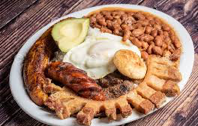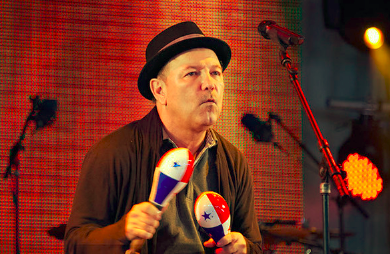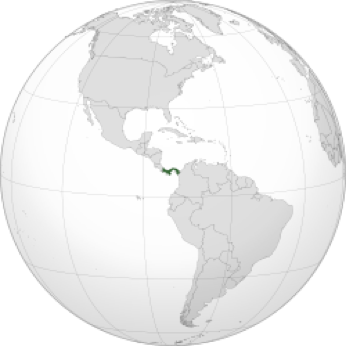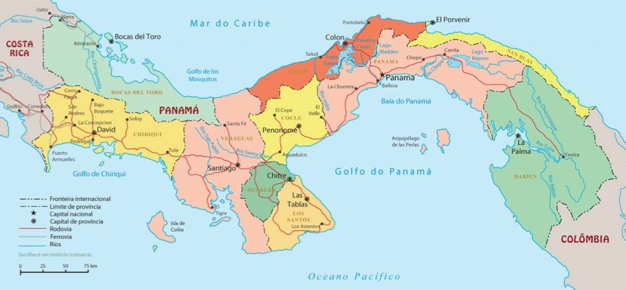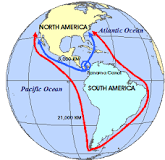Capítulo 8: La vida diaria
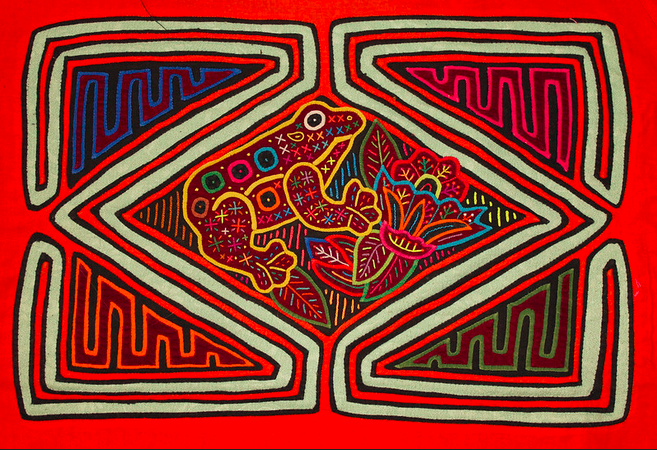
Sobre los artistas: Los indios Kuna viven en las Islas de San Blass cerca de la costa de Panamá. Las mujeres hacen las molas (que significa “ropa” o “blusa”). Las molas son textiles cosidos en paneles con diseños complejos y múltiples capas usando una técnica de appliqué inverso y que representan la flora y la fauna de la región.
Capítulo 8: La vida diaria
Learning Objectives
At the end of this chapter, students will be able to perform the following tasks in Spanish:
- I can describe my daily routine or a typical day
- I can talk about someone else’s daily routine
Vocabulario
- Daily Routine and Personal Hygiene
Mosaicos culturales
Las costumbres: la vida diaria
Estructuras gramaticales
- 8.1 Describing Daily Routine: Reflexive Verbs
- 8.2 Ordering Events: Infinitives after Prepositions
- 8.3 Expressing Negation: Indefinite and Negative Words
Escritura
Mi rutina diaria
Cultura
País: Panamá
Música: Rubén Blades
Personalidad: Mariano Rivera
Lectura
Lectura: El canal de Panamá
Vocabulario: La vida diaria
| Los verbos reflexivos | Reflexive Verbs |
|---|---|
| acordarse (de) (o:ue) | to remember |
| acostarse (o:ue) | to go to bed |
| afeitarse (rasurarse) |
to shave |
| alegrarse | to be happy; be glad |
| bañarse | to take a bath / shower |
| cepillarse el pelo | to brush one’s hair |
| cepillarse los dientes | to brush one’s teeth |
| despertarse (e:ie) | to wake up |
| dormirse (ue) | to go to sleep; to fall asleep |
| ducharse | to take a shower |
| enojarse (con) | to get angry (with) |
| irse | to go away; to leave |
| lavarse la cara | to wash one’s face |
| lavarse los dientes | to brush one’s teeth |
| lavarse el pelo (cabello) | to wash one’s hands |
| levantarse | to get up |
| maquillarse | to put on makeup |
| peinarse | to comb one’s hair |
| ponerse (perfume / la ropa) | to put on (perfume/clothes) |
| ponerse ( adjective) | to become ( adjective) |
| preocuparse (por) | to worry (about) |
| quedarse | to stay |
| quitarse (la ropa) | to take off (one’s clothes) |
| secarse (el pelo) | to dry oneself (one’s hair) |
| sentarse (e:ie) | to sit down |
| sentirse (e:ie) | to feel |
| vestirse (e:i) | to get dressed |
¡Inténtalo!
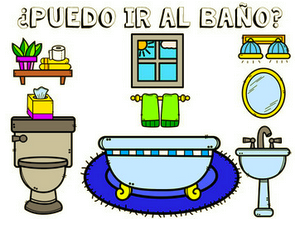
| En el baño | In the bathroom |
|---|---|
| el baño / el cuarto de baño | bathroom |
| la ducha | shower |
| el espejo | mirror |
| el inodoro | toilet |
| el lavabo | sink |
| la toalla | towel |
| el acondicionador | conditioner |
| el champú | shampoo |
| la crema de afeitar | shaving cream |
| la crema (pasta) de dientes | toothpaste |
| el desodorante | deodorant |
| el jabón | soap |
| el maquillaje | makeup |
¡Inténtalo!
| Palabras de secuencia | Sequence Words |
|---|---|
| antes (de) | before |
| después | afterwards; then |
| después (de) | after |
| durante | during |
| entonces | then |
| finalmente |
finally |
| luego | then |
| más tarde | later |
| por la mañana | in the morning |
| por la noche | in the afternoon |
| por la tarde | at night |
| por último | finally |
¡Inténtalo!
| Palabras adicionales | Additional Words |
|---|---|
| el despertador | alarm clock |
| las pantuflas | slippers |
| la rutina diaria | daily routine |
Actividad # 1
Los productos personales. Using terms from the word bank, fill in the blank to complete each sentence.
| Banco de palabras | ||||||
|---|---|---|---|---|---|---|
| Colgate | Maybelline | champú | jabón | gel de ducha | acondicionador | Gillete |
- Me lavo la cabeza con _____ y _____.
- Me cepillo los dientes con _____.
- Me maquillo con _____.
- Me ducho con _____.
- Me lavo las manos con _____.
- Mi esposo se afeita con _____.
Y ahora tú... Respond to the following questions:
- ¿Qué productos personales usas? _______________
- Normalmente, ¿Dónde los compras? _______________
Actividad # 2
Ordenar. Listen to your instructor’s Monday routine. Then, use numbers 1 to 8 to put the activities below in order according to what you heard.
____ a. peinarse e. ____ ducharse
____ b. dormirse f. ____ irse al trabajo
____ c. almorzar g. ____ vestirse
____ d. levantarse h. ____ leer un libro
¡Inténtalo!
Actividad # 3
Seleccionar. Select the word that does not relate to each group.
- espejo – champú – acondicionador – jabón ________________
- ducharse – secarse – baño – vestirse _______________
- pelo- cara – manos – inodoro ___________________
- toalla – secarse – lavarse – despertador _______________
- acostarse – dormirse – levantarse – finalmente ________________
- dientes- pelo- cepillarse- jabón ___________________
- lavabo – jabón- despertador – toalla ________________
¡Inténtalo!
Mosaicos culturales: La vida diaria
En Latinoamérica, el desayuno se come muy temprano por la mañana, generalmente antes de las 8 de la mañana, antes de ir al trabajo.El almuerzo es de 1 a 3 de la tarde (en México y España) y es la comida más fuerte del día.Por lo regular, la cena se sirve entre las 8 y las 9 de la noche y es una comida más liviana (light meal).

Y ahora ustedes…
- ¿Cómo es el horario del almuerzo en este país?
- Describe tu almuerzo típico.
La comida más importante del día
La comida más importante del día es el almuerzo. Muchas personas hacen una pausa de 2 horas para comer. Muchos negocios pequeños cierran o bien organizan los horarios de sus empleados.
El desayuno y la cena son generalmente comidas ligeras y rápidas.
Y ahora ustedes…
- ¿Cuál es la comida más importante en este país?
- ¿Qué comes normalmente para tu almuerzo?
8.1 Gramática: Describing Daily Routine: Reflexive verbs (los verbos reflexivos)
A. How do I recognize a reflexive verb?
The infinitive form of reflexive verbs will have a “SE” at the -ar, -er, and -ir ending.
Ejemplo: levantarse (to get up), vestirse (to get dressed)
The SE at the end of a verb is a red flag: “Hey! I am a reflexive verb!”
B. When do I use reflexive verbs?
A reflexive verb indicates that the subject does something to or for himself or herself. (actions done to oneself). Reflexive verbs ALWAYS use reflexive pronouns.
Subject: María
Reflexive: se ducha por la noche. (María showers at night.)
C. How do I conjugate reflexive verbs?
Here is the present tense of the verb levantarse (to get up) with reflexive pronouns. To conjugate, change the verb’s ending based on the subject as you normally do.
| levantarse: to get up | |
|---|---|
| (yo) me levanto: I get up | (nosotros) nos levantamos: we get up |
| (tú) te levantas: you (inf. sing.) get up | (vosotros) os levantáis: you (inf. pl. Spain) get up |
| (usted/él/ella) se levanta: you (pol. sing.) get up; he/she gets up | (ustedes/ellos/ellas) se levantan: you (plural) get up; they get up |
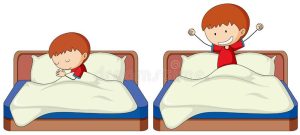
Los lunes, (yo) ME LEVANTO a las 7 am., pero mi hermanita SE LEVANTA a las 8 am. A ella le gusta QUEDARSE en cama.
D. Las actividades diarias
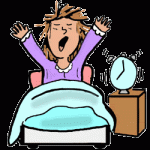 |
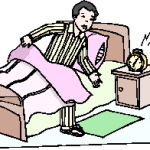 |
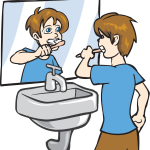 |
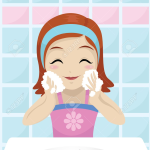 |
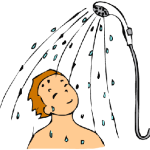 |
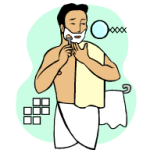 |
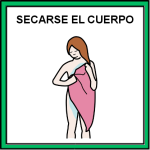 |
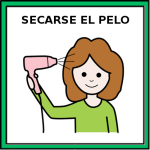 |
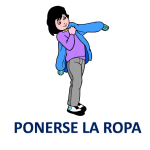 |
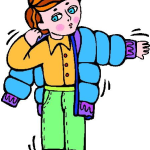 |
|---|---|---|---|---|
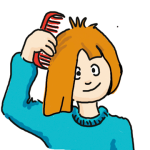 |
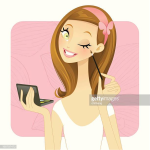 |
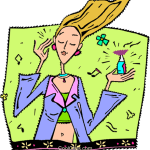 |
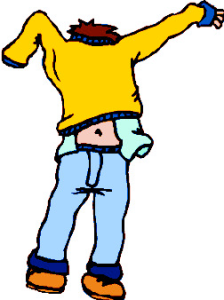 |
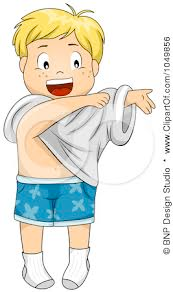 |
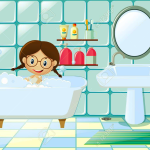 |
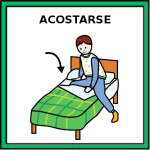 |
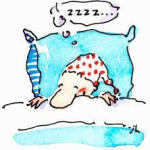 |
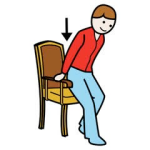 |
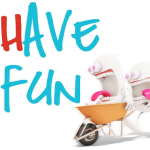 |
| Algunas partes del cuerpo | |
| la cara | face |
|---|---|
| el cuerpo | body |
| los dientes | teeth |
| la mano | hand |
| la nariz | nose |
| los ojos | eyes |
| el pelo; cabello | hair |
(yo) Me lavo el pelo tres veces a la semana, pero mi hermana se lo lava todos los días.
I wash my hair three times a week, but my sister washes it every day.
Mi mamá se maquilla la cara, pero no los ojos.
My mom puts makeup on her face, but not on her eyes.
E. Common Reflexive Verbs.
Following is a list of verbs with the reflexive pronouns ME (myself) and SE (himself, herself, yourself [polite singular]) that you can use to describe your daily routine and that of someone else.
| Phrases | Infinitive | |
|---|---|---|
| Me acuesto / Se acuesta | acostarse | I go to bed/he-she goes to bed; you (pol. sing..) go to bed |
| Me despierto / Se despierta | despertarse | I wake up / he-she wakes up; you (pol. sing..) wake up |
| Me levanto / Se levanta | levantarse | I get up /he -she gets up; you (pol.sing.) get up |
| Me baño / Se baña | bañarse | I take a bath (shower) /he -she takes a bath; you (pol. sing..) take a bath |
| Me ducho / Se ducha | ducharse | I take a shower /he -she takes a shower; you (pol. sing..) take a shower |
| Me lavo el pelo / Se lava el pelo | lavarse el pelo | I wash my hair / he -she washes his-her hair; you (pol. sing.) wash your hair |
| Me seco / Se seca | secarse | I dry off /he -she dries off; you (pol. sing.) dry off |
| Me afeito / Se afeita | afeitarse | I shave/ he – she shaves; you (pol. sing.) shave |
| Me lavo (cepillo) los dientes / Se (cepilla) los dientes | lavarse los dientes | I brush my teeth/ he-she brushes his-her teeth; you (pol. sing..) brush your teeth |
| Me peino / Se peina | peinarse | I comb my hair/ he-she combs his-her hair; you (pol. sing.) comb your hair |
| Me maquillo / Se maquilla | maquillarse | I put on makeup/he-she puts on makeup; you (pol. sing..) put on makeup |
| Me pongo la ropa / Se pone la ropa | ponerse la ropa | I put on my clothes / he – she puts on his-her clothes; you (pol.sing.) put on your clothes |
| Me quito la ropa / Se quita la ropa | quitarse la ropa | I take off my clothes/he-she takes off his-her clothes; you (pol.sing.) take off your clothes |
| Me visto / Se viste | vestirse | I dress / he-she dresses; you (pol.sing.) dress |
| Me desvisto / Se desviste | desvestirse | I undress / he – she undresses; you (pol.sing.) dress |
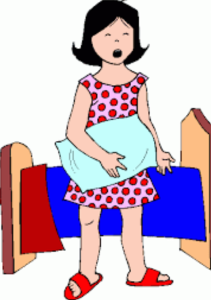
Los lunes, me levanto temprano. |
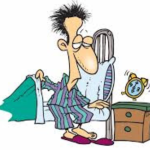
Mi esposo se levanta temprano también. |
|---|
Reflexive pronouns are usually placed directly before the verb. HOWEVER, they may be attached to infinitives (ducharme) and present progressive (duchándome).
**When you have a two-verb phrase, you can place the pronoun attached to the second verb (prefiere peinarse) or at the beginning of the conjugated verb (se prefiere peinar).
COMPARE and CONTRAST
Unlike English, several verbs in Spanish can be reflexive or non-reflexive. To distinguish between when a verb may or may not be reflexive, consider the following:
Lavar (to wash) vs. Lavarse (to wash oneself)
If I wash the dishes–I am doing the washing, but I am not the one being washed, then non-reflexive is used; LAVAR. However, if I wash my hands, I am the one doing the washing and being washed. The reflexive is used: LAVARSE.
Yo LAVO los platos todos los días. Ella LAVA los platos.
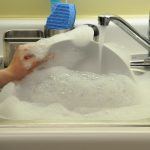
(yo) ME LAVO *las manos antes de comer. Ella SE LAVA las manos.
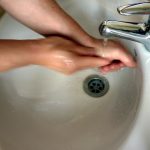
*Nota: Parts of the body or clothing are generally not referred to with possessives but with articles.
Los niños se lavan las manos. Yo necesito cepillarme los dientes.
Actividad # 1
¡A conjugar! Conjugate the following reflexive verbs using the appropriate reflexive pronoun and verb ending. Then, fill in the blanks to complete the sentences below.
| Cepillarse: to brush oneself | |
|---|---|
| (yo) | (nosotros – as) |
| (tú) | (vosotros – as) |
| (usted/él/ella) | (ustedes/ellos/ellas) |
| Maquillarse: to put makeup on oneself | |
|---|---|
| (yo) | (nosotros -as) |
| (tú) | (vosotros- as) |
| (usted/él/ella) | (ustedes/ellos/ellas) |
| Ponerse: to put on oneself / to get | |
|---|---|
| (yo) | (nosotros -as) |
| (tú) | (vosotros -as) |
| (usted/él/ella) | (ustedes/ellos/ellas) |
| Despertarse: to wake up | |
|---|---|
| (yo) | (nosotros -as) |
| (tú) | (vosotros-as) |
| (usted/él/ella) | (ustedes/ellos/ellas) |
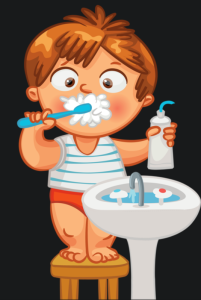
1. Este niño ____ ______ los dientes con el cepillo y la pasta dental.
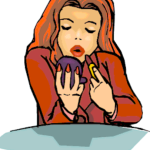
2. Lola ____ ________ por la mañana.
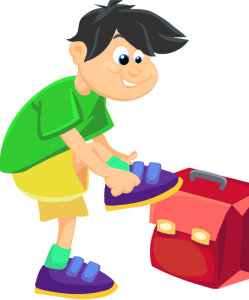
3. Pablito ____ ______ los zapatos.
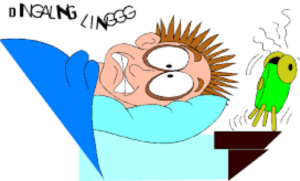
4. El señor ____ ______ muy enojado. No le gusta el despertador.
Actividad # 2
Escoger. Choose the sentence that best describes the following pictures.

